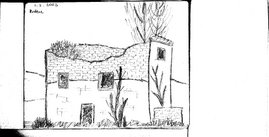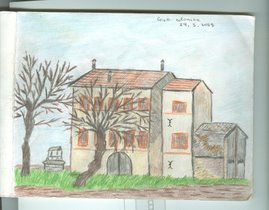As a member of Purdue University I received this letter dealing with safety problems at Purdue in case of incidents similar to that at Virginia Tech - murder of 32 persons by a mentally ill student.
After the letter, my reply.
April 24, 2007
To All Purdue Students, Faculty and Staff:
In the days following the tragic events at Virginia Tech University, some students, parents, and other members of the Purdue community have inquired about safety procedures on the West Lafayette campus, our capacity to respond to a large-scale emergency, and our ability to communicate with students, faculty, and staff in case of an emergency. As we all mourn the loss of life at Virginia Tech, including the death of two professors who were Purdue graduates, we want to assure all those in our community that campus safety is one of our highest priorities.
The Virginia Tech tragedy was a unique situation, but it reminds us that even in very safe environments, we have to be ready to respond. We believe the Purdue campuses are very safe, and we work constantly to make them safer. In the wake of this tragedy, all units involved with security at Purdue have met in recent days to review our state of readiness and apply lessons that we have learned.
While no amount of training and precaution can guarantee absolute safety at all times, Purdue police and other public safety personnel are exceptionally well-prepared. Purdue has extensive emergency contingency plans in place. For the West Lafayette campus, which is by far the largest and most complex of our campuses, you will find good information about safety on the Purdue police Web site: http://www.purdue.edu/police.
Despite what you may have heard or read about the situation at Virginia Tech, a campuswide "lockdown" is not truly possible. A campus like ours is too large with too many buildings and doors. What we can do, though, is issue a call to "shelter in place," alerting everyone to stay inside or seek shelter where they can be safe until more information is known and can be given. The decision on what to do in an emergency is one that must be made by trained experts who take into account all circumstances.
As for our ability to communicate in an emergency that represents a threat to people on campus, the university has several ways to reach students, faculty, and staff, including:
* In the event of a campuswide emergency, warning sirens might be sounded. This signal tells you to go to the lowest level in the building you are in and to begin checking e-mail, the Purdue home page, or news media sources to learn the nature of the problem. The procedure is the same for extreme weather conditions or other emergencies. The sirens are tested on a regular basis.
* We are able to e-mail building deputies in every building, including our residence halls. They, in turn, may forward the e-mail or go to offices or rooms in person. They also may post signs on doors or in hallways. Sending an e-mail to our 200 building deputies is much faster than sending one to 50,000 students, faculty, and staff.
* We are exploring the possibilities offered by Facebook. We have just created a "Purdue Emergency Notification" group on Facebook that anyone with a purdue.edu address can join to receive safety-related information. We also may be able to use it to send alerts as text messages to mobile devices such as cell phones, as e-mail, or to a Facebook account.
* We also have the capability to e-mail all people with a Purdue address. For example, we sent out alerts before and during a snow recess last winter to Purdue e-mail accounts for students, faculty, and staff. The system works well, but a massive e-mail transmission may take an hour or two at best to reach everyone.
* Anyone, including parents, wishing to receive e-mail alerts also may sign up via the Purdue home page.
* We have a telephone tree in place for contacting those living in fraternity, sorority, and cooperative houses.
* Residence hall and communications administrators are on a paging system that receives alerts about any police, hazard, or fire activity. The pagers provide short text messages about the incident. When pages are received, these people can activate our emergency communications plan.
* The residence halls have procedures for alerting people in individual halls via their resident assistants, phones, and signage.
* The Purdue home page (http://www.purdue.edu) is the focal point of the most complete information for all campus-related emergencies.
* And, of course, we utilize the news media - radio, TV, and Internet - to help spread the word.
We are exploring several other options as well. As we refine emergency notification procedures, we will provide you with updated information. We also will share this information with prospective and incoming students during Day on Campus and Boiler Gold Rush.
Purdue is a large and complex institution, and people move about our campuses freely. Despite advances in communication, there is no way to reach everyone instantly with a single message. However, the multi-layered approaches described above will spread the word quickly.
Sincerely,
XX
Sr. Director, Environmental Health and Public Safety
XX
Vice President for Student Services
-----------------------------------
My reply:
Hallo. Thank you for your information which can be useful in case of emergency
similar to what happened at Virginia Tech, but to say that 'Purdue University
is a safe place' is non true at all. Not so much for Purdue's safety system but
rather because what happened at Virginia Tech may happen in any moment and in
any place all over USA. Anyone can buy a weapon and kill without even being
submitted to a control. Probably the most useful way to be safer in USA is to
collect signatures in order to propose and to achieve a strong reduction of
weapons for citizens.
For this reason, and certainly not because Americans are more criminal than
other populations, USA has a number of murders more than 3 times Italy, which
is a country with a high level of criminality in Europe, and much much more than other countries in Europe like Germany and France.
This is the real problem in USA and only with a reduction of weapons for
citizens, Americans will be safer.
Best wishes, Roberta Barazza
TA for Italian
Personal blog in English. If you want to leave a comment, write to barazza.roberta@gmail.com
About Me
ruins

country house

novi mesto (slovenia). commercial center

warsaw. iceskating little rabbit

viterbo (italy). shop

udine. helicopter

udine. tractor

motovun (croatia)

krasica (croatia)

church in slovenia

slovenia

armour

rome. palm tree

dog carrying a newspaper

rome. campo dei fiori. giordano bruno's statue

rome. Palazzo Venezia
